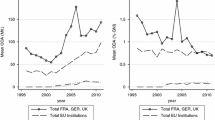Abstract
Stimulated by the World Bank report Assessing Aid, the concept of ‘good governance’ has been introduced as an important idea by several European donors. On the one hand, ‘good governance’ could be seen as a condition for aid, leading to selectivity and a narrower choice of aid recipient. On the other hand, the lack of ‘good governance’ or ‘bad governance’ could be seen as a deficit, even a normal deficit, inherent in developing countries and thus be treated as a goal for development cooperation. This paper sketches the way in which several European donors try to deal with the concept of ‘good governance’, and how they try to define the concept and make it useful for cooperation strategies. It will present a short overview of donor funding for ‘good governance’. It is based on research done for the Scientific Council for Government Policy (WRR) in the Netherlands as an input for Dutch government policy on ‘good governance’. Case studies come from Sweden, Norway, the United Kingdom, France and the Netherlands. The paper tries to describe analyses made by the agencies as well as the problems of putting these analyses into practice.
Suite à la publication du rapport de la Banque Mondiale « Assessing Aid », le débat sur le concept de « bonne gouvernance » s'est imposé chez plusieurs bailleurs des fonds européens. D'une part, la « bonne gouvernance » peut être vue comme une conditionnalité de l'aide, guidant la sélection et conduisant à un choix plus limité des receveurs de l'aide. D'autre part, une absence de « bonne gouvernance » ou une « mauvaise gouvernance » peut être considérée comme un déficit, éventuellement normal, inhérent au statut de pays en développement et, de ce fait, comme un objectif de la coopération au développement. Cet article décrit brièvement différents itinéraires suivis par plusieurs bailleurs des fonds européens pour définir ce concept et le rendre utile pour leurs stratégies de coopération. Il donne un aperçu des allocations de l'aide selon ce critère de « bonne gouvernance ». Il repose sur une recherche effectuée pour le Conseil Scientifique pour la Politique Gouvernementale (WRR) des Pays Bas, dont les recommandations devraient être prises en compte par la politique Néerlandaise en matière de « bonne gouvernance ». Des études de cas proviennent de Suéde, de Norvège, du Royaume Uni, de France et des Pays Bas. L'article essaie non seulement de décrire les analyses faites par ces agences de coopération, mais aussi les problèmes auxquels elles sont confrontées lors de la mise en œuvre.
Similar content being viewed by others
Author information
Authors and Affiliations
Rights and permissions
About this article
Cite this article
Hoebink, P. European Donors and ‘Good Governance’: Condition or Goal?. Eur J Dev Res 18, 131–161 (2006). https://doi.org/10.1080/09578810600576768
Published:
Issue Date:
DOI: https://doi.org/10.1080/09578810600576768



